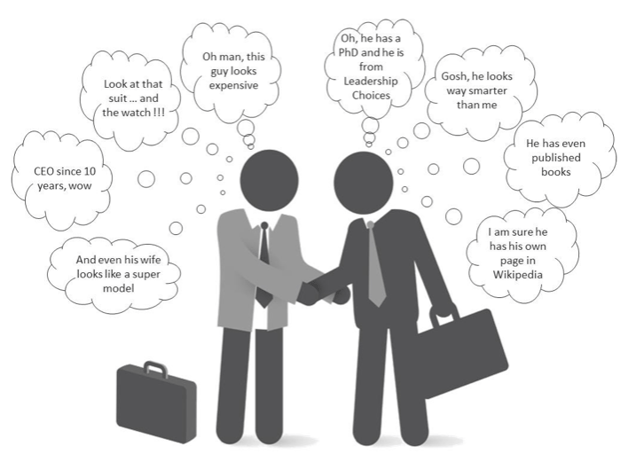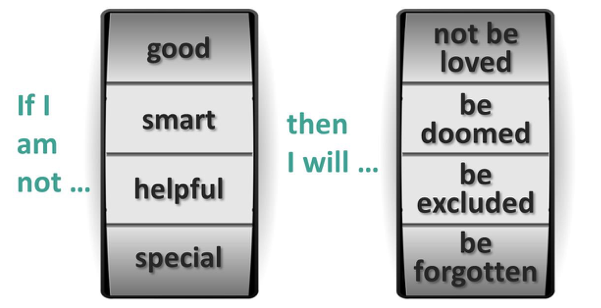Insecure Overachievers and Their Beliefs
The Insecure OverachieverSince the 1950s, McKinsey & Company, one of the world’s leading strategy...
Since the 1950s, McKinsey [&] Company, one of the world’s leading strategy consulting companies, has been known to employ the best graduates from the best universities, and to use performance incentives and a very formative high performance culture to shape these young, hungry ‘high potentials’ according to their requirements. After these young consultants were pushed to the maximum by their international projects, most of them voluntarily leave the company on good terms after three years at the latest in order to take up leading positions in the industry and then to become potential customers of their former employer. Over the past few decades, this HR strategy and its accompanying high performance culture was adopted in the field of professional services by the majority of international companies and is now also entering many more traditional industrial and service-based companies.

Insecure overachievers
The expression which best describes McKinsey’s employee profile is the ‘insecure overachiever’, who is to be found in many management positions today. This circle of people is well-educated, intelligent, good-looking, mobile and highly performance motivated. However, the moment you look behind the shiny façade, which we of course regularly do in our work, you find people who are continuously plagued by the question: “Am I good enough?”.
Of course there are many kinds of people walking through life with these or similar questions occupying their minds, but this group of persons compensates these nagging inner doubts with permanent high performance and success, not having any other available mechanism for accepting themselves in their state of imperfection, which effectively all of us are. This inner pressure is an enormous career motor and leads to a very specific way of life, which focuses on work alone. As long as insecure overachievers are successful, the flywheel continues to turn. Problems generally arise when they are no longer successful; then their identity crisis is inevitable and their downfall steep. However extreme the case of the insecure overachiever may sound, rest assured that variations of this pattern are the norm and not the exception.
When our past drives our presence
We often work with managers who, although they might on the surface appear to be successful and confident, have recounted how, in some situations, they feel like ‘driven people’, like they were no longer in control of their inner world. The situations in which this happens are typically marked by high pressure or insecurity. This account describes the typical effect of inner beliefs, which also constitute a risk factor, both for one’s inner mental balance and for one’s ability to bounce back when faced with setbacks.
The concept of beliefs
Beliefs are decisions with regard to one’s life that people have made in their childhood and internalized. Long before an employee or manager has to prove themselves in the ‘company system’, he has developed success strategies in the ‘family system’. A lot of managers don’t like to think back to the time when, unlike now, they were small, weak and insecure, and feel like they are ‘on the couch’ when the topic of their childhood crops up. And yet, it was already at this point in time, that the course was set.
As a child, each person already learns how best to handle the ‘family’ system in order to be successful. Love and attention are the success criteria of a child. Beliefs are therefore strategies with which a child tries to obtain parental love and attention. In the corporate world, this is later known as ‘visibility’ and ‘recognition’. When devising its strategy, a child can of course only fall back on its childish logic. This is characterized by magical thinking ‒ that is to say the belief that the child’s environment only behaves as it does in response to the child’s behavior. Examples of magical thinking are: “I have to be obedient, so that my brother gets healthy again”, or: “I have to work really hard at school, so that mum and dad don’t argue so much anymore”. These child-like decisions become consolidated as coping strategies in the course of the years, finding their equivalent in the brain in the form of neuronal stimulation patterns. This is why these strategies remain relevant into late adulthood, even though the system in which the person now moves is a completely different one.
The most personal is the most universal
Interestingly enough, in our work with managers we have noticed that the number of different beliefs that these managers have internalized is limited. As Frank Farrelly, the founder of provocative therapy, we too find that “what is most personal is most universal”. The beliefs of executives can usually be reduced to a certain number of musts (i.e. positively formulated belief) and must nots (i.e. negatively formulated beliefs) as described in the following table.
| Musts | Musts not |
| I have to be perfect. | I must not show myself as I am. |
| I have to be quick. | I must not be different. |
| I need to please everyone. | I may not be successful. |
| I must be strong. | I must not be like everyone else. |
| I must make an effort. | I must not ask for help. |
| I must be careful. | I must not show my feelings. |
From an evolutionary perspective it has always been crucial for men to not be excluded from his tribe. Hence beliefs can be seen as a strategy to avoid rejection or exclusion and obtain positive attention. Over the years we have noticed that beliefs can best be elicited when they are brought into a logic of if-then. The following picture of the “Dysfunctional Belief Configurator” describes our understanding of the logic of beliefs.

Doing the emotional balance sheet
It is important to understand that beliefs used to serve a positive purpose. Their intention was to protect us and guarantee access to positive affection. However, as we grow older and become adult professionals the side effects of our beliefs are becoming more and more visible. Say you would be running the belief “If I am not good enough then I will not be loved”. In fact this is the evergreen of all beliefs. The benefits of this belief are most probably that you care for performance and that you like to deliver good work. Most probably you have had some sort of success in your career because of this belief and you enjoy a good reputation. The downside of this belief might be that you cannot enjoy your success because in the very moment you have achieved something it becomes normal. Also you may feel the urge for external appreciation to the degree that it might become an actual dependency. When you are not feeling it this may stress you out and you may actually feel threatened by the situation.
Beliefs surface under pressure
These beliefs surface more frequently when a manager is not in his comfort zone, e.g. because he is encountering something new, unfamiliar, particularly thrilling or threatening. Since neuronal patterns cannot be deleted, an old belief cannot simply be erased. Instead, a new and more appropriate behavior strategy has to be developed and practiced. Stay tuned for our next blog in which we describe how to actually do this.

Karsten is passionate about getting to the core of things in leadership coaching. His clients often describe him as an intuitive, empathic and at times challenging sparring partner who asks the right questions.
He helps his clients to look at issues from a different angle to reach their goals.
Karsten has an extensive international business and leadership background gained over 16 years.
He held leading positions at Accenture, Bombardier Transportation and Dell. In his last position as Managing Director for DELL's consulting business, he built up the field of business consulting in Europe.
Karsten is a Leadership Coach since 2006. He is accredited by the European Mentoring and Coaching Council (EMCC)and the World Economic Forum. He published several articles and books on the topics leadership, coaching and resilience. Furthermore, he is a certified psychotherapist (naturopath) and works as faculty at the Center for Responsible Leadership at WHU business school in Koblenz.

The Insecure OverachieverSince the 1950s, McKinsey & Company, one of the world’s leading strategy...

It is not easy to be a manager, and even more difficult the higher you climb. But increased speed,...
Leave a Comment